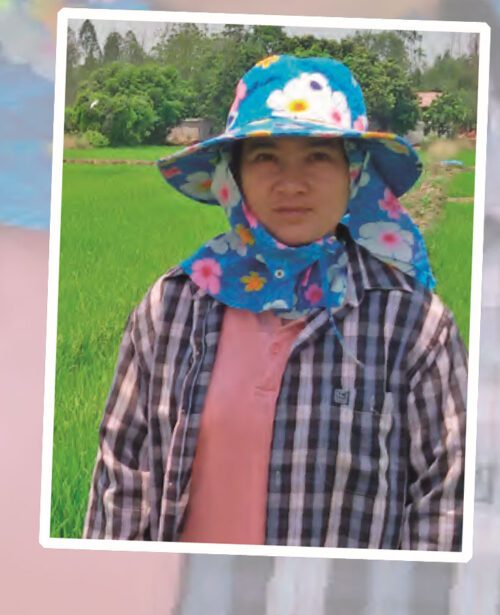Wandee Moonma
Tron District, Outaradit Province, Thailand
Wandee Moonma, 40, started her life as a farmer around six years ago, when her husband inherited some land. In her community, each household has at least 10 rai of rice fields, or around 1.5 hectares of land.
Like most women in the community, Wandee’s days were mostly spent in the fields, helping her husband drain water into the rice fields, applying fertilisers, and spraying pesticides. A mother of two children, she admitted that she started farming without much knowledge. She was always fearful of labor shortage and of losing money.
To cope with these fears, she relies heavily on chemicals, believing that she was protecting her rice fields from insects and other epidemics. All her neighbors were also using chemicals, and she fears that insects could be migrating from their fields to hers.
In Wandee’s rice-growing community, majority of the people face the same problems: the spread of insects, the high costs of chemical inputs, and debts to the Bank of Agriculture. Wandee expressed that they face similar problems caused by pesticides: “We used huge amounts of concentrated pesticides. My home is also located in the path of the wind, so when my neighbors use pesticides, it causes a very bad smell and I have to leave home. This happens to almost everyone.”
Every year, Wandee and her husband felt themselves grow weaker and weaker, their health turning bad. Because of the farming costs, their debt also increased.
So when the Farmer Field School project came to their community, Wandee and her husband were attracted to the principles it presented to support farmers. So they decided to join. At the first cropping, after the Integrated Pest Management (IPM) activities, Wandee saw at once how costs were reduced and how her health was improved. Now, they are able to keep rice grains for family consumption, in keeping with the IPM principle. “Insects that I thought were enemies have become friends. The good results also encourage involvement from other community members,” Wandee added.
Presently, Wandee works as a women’s group coordinator to persuade interested housewives to stop using pesticides in their rice fields, and to search for new methods instead. She revealed that in the rice fields, most women take control over how to do things. “Before, I used to tell my husband to spray pesticides in the fields and to buy from the shop. So if we would like to reduce chemical use in our community, we must encourage both husbands and wives to learn and make decisions together,” she said.
The Famer Field School now has around 20 members; half of them are women. Before, the community members work separately in the fields with little or no interaction. Now they work closely together, sharing knowledge, especially among women farmers.
The results are concrete: accounting books show that before, farmers each spent no less than 300,000 Thai Baht or THB (USD 8662 at 1 USD = 35 BHT conversion rate) for insecticides alone. But in their most recent yield, they paid only 3,000 THB (USD 87) for supplemental costs. They are now enjoying lower expenses and higher profits. “These made us see clearly the difference in the costs. Our health has been getting better as well,” Wandee said.
Wandee has some recommendations to improve the IPM project and have more community members involved in its activities. For her, the women’s group is not enough to effect a huge change. “Government should take a leading role to promote and support these activities. Even though Thailand is currently faced with drought conditions and the government has encouraged farmers to grow crops that need less water, like red onion instead of rice, we still want to continue growing organic rice,” she said.
For her, scaling up their current efforts means setting up their own community rice mill, and learning how to package organic rice so that it sells better in the market.


